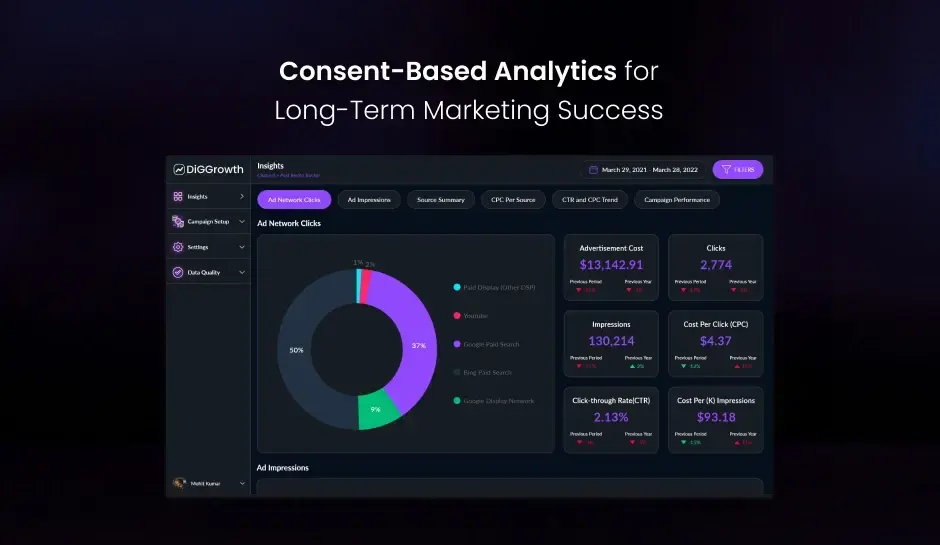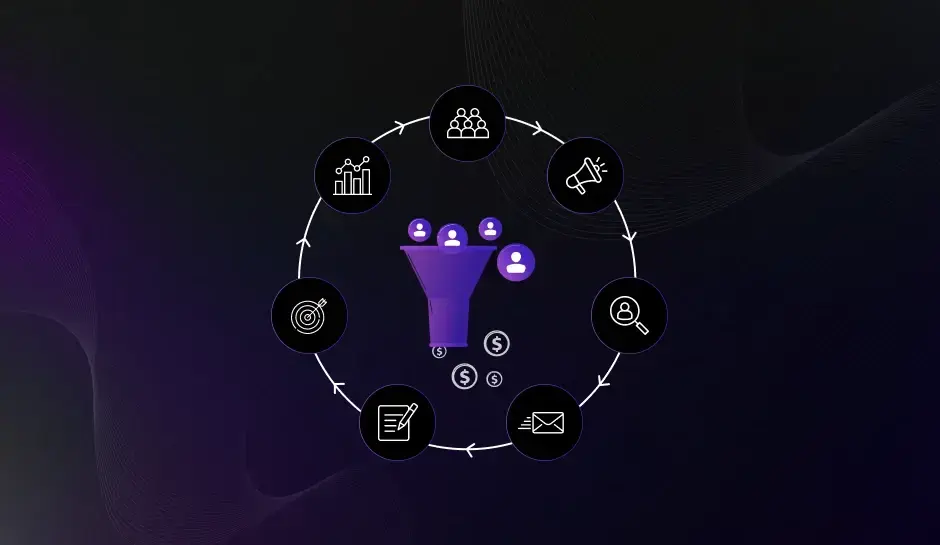Call Tracking Data in Google Analytics 4: A Master Key to Integrating Your Marketing Analytics
Discover how call tracking data revolutionizes marketing analytics, bridging online engagements with offline interactions. Learn about Dynamic Number Insertion (DNI), multi-channel attribution, and actionable insights for optimizing campaigns. Explore the role of call tracking data in understanding customer journeys, enhancing lead generation, and driving sales. Get expert guidance on privacy compliance and maximizing ROI with detailed analytics. Dive into the future of marketing with predictive insights and stay ahead in a data-driven world. Read more now!
Call Tracking is not just a technical concept; it’s a revolution in understanding the customer journey—from the first click to the final conversation. In the modern marketing landscape, where digital footprints are meticulously analyzed, Call Tracking is the crucial bridge that links the dots between online engagements and offline interactions.
Imagine you’ve mastered online analytics, but there’s a black hole in your data whenever a customer picks up the phone. Here’s where Call Tracking data shines, offering unparalleled insights into the often-overlooked voice conversations. By incorporating this technology, marketers can finally complete the puzzle of marketing analytics, gaining a comprehensive view of how their campaigns influence actual conversations.
Let’s explore why this innovative tool is essential for businesses that aim to make data-driven decisions that resonate across every touchpoint of the customer experience.
The Mechanics of Call Tracking Implementation

At the heart of it is something called Dynamic Number Insertion (DNI). DNI is a smart trick. It works by showing different phone numbers to each person who visits your website. This helps businesses determine which ads or marketing stuff is making people call. They do this by giving different numbers to different ads or places they advertise. Brand awareness is enhanced through this method, as it directly links customer inquiries to specific marketing initiatives.
How Dynamic Number Insertion Operates
When a user lands on your website, a unique phone number is dynamically generated and presented to them. This process is seamless and instantaneous, ensuring a cohesive user experience. The number the visitor sees is tied to their session details, meaning that when they decide to make the call, the call tracking system can attribute it directly to the correct marketing source, whether it’s a search engine, a paid ad, or a social media campaign.
DiGGrowth’s Contribution
DiGGrowth’s campaign tracking module integrates effortlessly with popular analytics platforms like Adobe Analytics and Google Analytics. Whether using custom parameters or standard UTM parameters, DiGGrowth ensures data hygiene and campaign standardization. This automated solution streamlines campaign data harmonization processes, maintaining consistency across platforms without manual intervention. Effective management of this data enhances overall marketing performance and enables teams to make informed decisions based on accurate insights.
Integration with Websites
Integration with your website’s backend is essential to ensure call tracking data is accurately linked to marketing endeavors. This is achieved through the implementation of tracking code or scripts. Upon this foundation, the calls that stem from your website are not simply tallied but intricately connected to the user’s journey, clearly showing which marketing strategies are most effective at prompting customer responses.
Multi-Channel Attribution and Analytics
Achieving a panoramic view of marketing effectiveness necessitates a multifaceted approach. With multi-channel attribution, you gain insight into how each channel contributes to the customer journey. Furthermore, by integrating call tracking with Google Analytics, you can enrich your data with comprehensive tracking that spans online and offline interactions, delivering a full spectrum of consumer behavior analytics. Automation of these processes synthesis allows for meticulous assessment and strategic planning, ensuring that every decision is data-driven.
- Dynamic Number Insertion:
- Website Integration:
- Google Analytics:
Assigns unique numbers to track user engagement.
Links calls to specific user actions and marketing campaigns.
Complements call data with online traffic analytics for a holistic view.
Unlocking Customer Insights Through Call Tracking
Delving into the depths of call-tracking data equips businesses with the power to transform their customer engagement strategies. This treasure trove of information offers a granular view of the customer journey, making every interaction more intelligible and actionable.
Deciphering the Customer Journey with Call Tracking
Call tracking is more than a mere count of phone calls; it’s a pivotal tool in Customer Journey Mapping. By analyzing call origins, duration, and caller behavior, companies can identify critical touchpoints and tailor their marketing efforts to meet customer expectations at each stage. This strategic approach supported by sales process engineering, paves the way for a truly personalized customer experience, reflecting an understanding of individual customer narratives.
Amplifying Caller Experience and Service Excellence
Quality Caller Experience is paramount for fostering customer loyalty and driving business growth. Call tracking metrics reveal patterns that help businesses pinpoint strengths and weaknesses in their service delivery. By acting on these insights, organizations can iterate on their call-handling processes for continuous improvement, ensuring every call is an opportunity to delight the customer and enhance their experience.
Delving Deeper into Customer Needs with Call Analytics
Understanding customer needs can often feel like deciphering a complex code. However, call analytics metrics such as call duration, volume, and repeat calls indicate customer sentiment and intent. By dissecting this data, businesses can more adeptly align their customer support and sales strategies to address frequently raised issues and adapt their approaches to meet evolving customer needs, leveraging insights from software development.
The Role of Call Tracking in Conversion Tracking

Understanding a customer’s path from initial interest to final purchase is crucial for any business. With increasingly sophisticated digital marketing strategies, call tracking is an indispensable tool. It is an adjunct feature and a core component of accurate conversion tracking. By integrating DiGGrowth into your call tracking processes, businesses can gain deeper insights into their customer journey, understand the effectiveness of marketing touchpoints, and optimize their conversion tracking efforts effectively.
The Importance of Measuring Phone Call Conversions
- Complete Conversion Data:
- Quality Leads:
- Personalized Customer Experience:
Integrating call tracking data provides a fuller picture of conversion metrics across different platforms and channels.
Phone calls often represent higher quality leads as they directly interact with your business, potentially signaling a higher readiness to purchase.
Understanding which campaigns drive calls enables businesses to tailor customer interactions more effectively, often leading to increased customer satisfaction and higher conversion rates.
Pro Tip- By acknowledging the central role of call tracking in conversion tracking, businesses can achieve a holistic analysis of their marketing efforts, adjust their strategies to harness high-converting channels, and allocate resources more efficiently to maximize ROI, while mindful of interruption marketing.
Step-by-Step Guide to Call Tracking with GA4 & DiGGrowth
Step 1: Accessing Your GA4 Property
Log in to your Google Marketing Platform account. If you haven’t created one yet, you can do so for free.

Click on the Admin section located on the left-hand side panel.
Step 2: Integrating DiGGrowth with GA4 (Optional)
While GA4 offers basic call tracking capabilities, DiGGrowth provides a more comprehensive solution with advanced features and seamless integration. Here’s how to connect them:
- Visit the DiGGrowth website and sign up for a free trial.
- Within DiGGrowth’s interface, navigate to the Settings section and locate the Integrations tab.
- Look for the Google Analytics 4 option and follow the on-screen instructions for establishing the connection.

Step 3: Leveraging Call Tracking Features in GA4
With DiGGrowth integrated (or using GA4’s native call tracking), you can access valuable call data within your GA4 property. Here’s how to find it:
- Navigate to the Engagement section in your GA4 property.
- Under Engagement, locate the Events card. This section displays all tracked user interactions, including phone calls.
Step 4: Analyzing Call Tracking Data
Within the Events card, you’ll find an event named “phone_call” (or a custom name you assigned in DiGGrowth). Click on this event to view detailed call data.
This data can include:
- Call source:
- Call duration:
- Caller location:
Identify which marketing channels (e.g., website, social media) are driving the most calls.
Understand how long callers engage on average, potentially offering insights into their level of interest.
Gain insights into your audience’s geographic distribution based on phone numbers.
Step 5: Extracting Meaningful Insights with DiGGrowth (Optional)
DiGGrowth goes beyond basic call tracking data, offering advanced features for deeper analysis:
- Conversion tracking:
- Call recordings:
- Multi-channel attribution:
Analyze how call tracking impacts your overall conversion rate, providing a clearer picture of marketing ROI.
Review call recordings to understand customer pain points, identify areas for improvement in your sales approach, and personalize future interactions.
Gain a holistic view of the customer journey by attributing phone calls to specific marketing touchpoints.
Step 6: Taking Actionable Steps
The insights gleaned from call tracking data empower you to make data-driven decisions and optimize your marketing strategies:
- Refine your campaigns:
- Optimize ad copy:
- Enhance website conversion:
- Empower your sales team:
Allocate budget towards channels that generate the most valuable calls.
Tailor your messaging to resonate with callers and encourage them to reach out.
Analyze call data to identify website elements that might hinder phone inquiries and streamline the user experience.
Equip your sales team with customer insights from call recordings to improve lead qualification and close more deals.
Maximizing Marketing ROI with Call Tracking Insights
![]()
Understanding marketing campaigns’ return on investment (ROI) is paramount for success. By implementing call tracking, businesses can unlock detailed insights into how their marketing efforts directly influence customer calls, much like a routing protocol directs network data traffic.
Calculating ROI with Call Tracking Metrics
Call tracking data is crucial to understanding the effectiveness of your marketing spend. You can identify which initiatives produce the highest conversion rates by attributing calls to specific campaigns. To calculate ROI, compare the revenue generated from these calls against the cost of your marketing efforts. This direct correlation empowers marketers to measure success precisely, enabling data-driven decisions that boost profitability.
Optimizing Campaign Performance with Actionable Insights
- Campaign Adjustments:
- Budget Reallocation:
- Ad Content Refinement:
- A/B Testing:
Quickly realign or halt underperforming campaigns based on real-time call data.
Shift marketing spending towards channels driving the most valuable customer calls.
Tailor ad copy and call-to-actions (CTAs) based on phrases and keywords that have historically resulted in higher conversion rates.
Use call tracking metrics to test different campaign variables and systematically improve outcomes.
Enhanced Lead Generation through Call Tracking
Integrating call tracking is a game-changer for businesses seeking to augment their lead-generation efforts. Call tracking data offers unprecedented insights, empowering marketers to make informed decisions that significantly boost their lead generation potential, enhancing their customer relationship management strategies.
Call Volume Trends: A Barometer for Lead Generation
Understanding call volume trends is vital in assessing and enhancing lead generation efforts. By analyzing the ebb and flow of call volumes, businesses can pinpoint peak periods of customer engagement and optimize their marketing strategies accordingly. Call tracking data helps to identify which campaigns generate the most calls, allowing for the reallocation of budget to high-performing channels and the refinement of overall marketing efforts to increase lead generation, ultimately supporting customer relationship management initiatives.
Pay-Per-Call Advertising: Harnessing the Power of Call Tracking Data
- Targeted Campaigns:
- ROI Measurement:
- Continuous Optimization:
Advertisers can use call tracking data to tailor their campaigns, resulting in more targeted outreach and improved lead quality.
Call tracking data’s clarity means that return on investment for Pay-Per-Call campaigns can be accurately measured, demonstrating the true value these calls bring to the business.
With real-time data, companies can continuously refine their advertising efforts, enhancing the potential for lead generation and increasing the efficiency of marketing spend.
Enhance Your Sales Team’s Effectiveness with Strategic Call Data Analysis
Call tracking data isn’t just a tool for marketers to assess campaign performance—it’s also an indispensable asset for elevating the performance of your sales team. By leveraging the insights from call data, sales managers can pinpoint key areas of improvement and coach their team to success.
Refining Training with Phone Call Recording and Compliance
Access to recorded phone calls through call tracking is invaluable for training purposes. Sales teams can review interactions to refine strategies. Artificial intelligence enhances this process by analyzing conversations for key insights and trends. DiGGrowth provides clear insights into what drives success, optimizing conversion tracking. Additionally, DiGGrowth ensures compliance with regulations, safeguarding operations and customer trust.
Unlocking Sales Opportunities through Call Data Insights
Each customer interaction is packed with insights; call tracking data is your key to unlocking them. By analyzing call data, sales teams can:
- Identify common objections and develop tactics to overcome them.
- Recognize patterns in customer inquiries that may indicate a market trend.
- Spot potential up-sell and cross-sell opportunities based on customer needs.
- Improve lead qualification processes by understanding the caller’s intent.
Customer Service Enhancement through Call Analysis
Improving customer service is a direct route to enhanced sales performance. Call data lets you understand a caller’s journey, sentiment, and satisfaction, leading to more effective communication and problem-solving approaches. Google AdSense can also be leveraged to create targeted ads that resonate with customer needs. Sales teams can turn customer interactions into lasting relationships and repeat business by continually optimizing customer service based on call data insights.
Pro Tip- From on-the-ground training to strategic decision-making, the power of Call Tracking Data lies in its application. Equip your sales team with these insights, and watch as they transform challenges into victories and insights into increased revenue.
Data Privacy Concerns with Call Tracking
As institutions and businesses increasingly leverage call tracking to optimize their marketing efforts and enhance customer service, privacy, and data protection policies associated with this technology have become a paramount concern. In an era where consumer data is both valuable and vulnerable, companies must prioritize the confidentiality and integrity of their call-tracking data, often relying on various programming languages to implement secure data management practices to maintain trust and comply with regulations.
Transparency in Call Tracking
Transparency is essential when it comes to using call tracking systems. Customers should be informed about the data collected during calls and how this information will be used. It is not merely about legality; it’s about fostering a relationship of trust between consumers and companies. Transparent practices include clear communication through privacy policies, opt-in options, and providing customers with access to the information collected about them, which can enhance strategies like site retargeting by ensuring that customers feel secure in their interactions.
Compliance in Phone Call Recording
Compliance with legal standards related to phone call recording is non-negotiable. Different countries have varying regulations, such as the GDPR in the European Union, which require explicit consent from individuals before recording their conversations. In addition to these regional laws, industry-specific guidelines may also apply, making it crucial for organizations to stay informed and ensure that their call-tracking practices are ethical and legal. Ensuring compliance protects organizations from legal repercussions, enhances brand equity, and fosters brand loyalty, as customers feel more secure when they know their privacy is respected.
Tackling Multi-Channel Attribution with Call Tracking
![]()
Multi-channel attribution is a marketing concept used to understand how different marketing channels impact a buyer’s journey and influence their decision to convert or purchase. Businesses must identify which touchpoints effectively drive sales, in their niche market, but attributing conversions to the right channel is often complex. This is where call tracking data becomes invaluable.
Traditionally, businesses face a significant challenge when attributing sales to the correct marketing channel. Online interactions are trackable through various analytics tools, but tracing that part of the journey back to digital campaigns can be problematic once a customer switches to a phone call. With call tracking, however, businesses are equipped to bridge that gap.
Companies can gather data on which specific interactions lead to calls by assigning unique phone numbers to different campaigns and channels. This granular level of insight allows organizations to accurately attribute phone sales to the correct marketing channels, even when those sales occur offline, ultimately enhancing their understanding of web traffic and its impact on overall performance.
- Are your digital ads leading to direct calls? Call tracking data can tell you.
- Is your SEO strategy paying off in terms of customer calls for more information? Again, call tracking provides the answer.
- What about social media campaigns? Call tracking can differentiate calls coming from those platforms as well.
Implementing call tracking does not solely point out the successful channels but also highlights less effective areas, allowing marketers to optimize their campaign strategies across all touchpoints. This comprehensive overview of a customer’s pathway through the conversion funnel enables more informed decisions on budget allocation, campaign adjustments, and strategic pivoting. This ensures that every part of the multi-channel mix is valued and noticed.
Key Takeaways
- Provides valuable customer insights to inform business strategies
- Empowers accurate conversion tracking to allocate marketing spending optimally
- Enhances lead generation efforts by pinpointing effective advertising channels
- Improves sales team performance with actionable call data
- Addresses multi-channel attribution challenges, ensuring a complete picture of the customer journey
Conclusion
Integrating call-tracking data into your marketing analytics toolkit is more than a smart strategy—it’s necessary for those seeking to thrive in a data-driven world. Embracing this technology allows marketers to fine-tune campaigns, sales teams to boost their performance, and businesses to ensure they respect data privacy laws.
Are you seeking undeniable insights that can translate into improved customer experience and revenue growth? Talk to Us!
Take the step now to ensure your business succeeds and excels in an increasingly competitive marketplace. Reach out to us at info@diggrowth.com and we’ll get back to you.
Ready to get started?
Increase your marketing ROI by 30% with custom dashboards & reports that present a clear picture of marketing effectiveness
Start Free Trial
Experience Premium Marketing Analytics At Budget-Friendly Pricing.

Learn how you can accurately measure return on marketing investment.
Additional Resources
Consent-Based Analytics for Long-Term Marketing Success
As marketers, we want our customers to perceive...
Read full post postDrip Campaign Mastery: 8 Tips to Nurture B2B Leads for Long-Term Success
Ever felt lost in the world of B2B...
Read full post postHow To Become An AI-Ready Organization
Remember the excitement around Google Lens or the...
Read full post postFAQ's
Call tracking data refers to information gathered from monitoring and analyzing phone calls made to a business. It provides insights into the source of calls, caller behavior, and the effectiveness of marketing campaigns in generating phone leads.
Call tracking assigns unique phone numbers to different marketing campaigns or channels. When a call is made to one of these numbers, the tracking system records data such as the caller's phone number, call duration, and the marketing source that prompted the call.
Call tracking is important because it bridges the gap between online marketing efforts and offline interactions. It allows businesses to attribute phone calls to specific marketing channels, understand customer behavior, optimize marketing strategies, and improve ROI.
Businesses can gain various insights from call tracking data, including which marketing channels are driving the most calls, the quality of leads generated from different campaigns, common customer inquiries or objections, and trends in customer behavior.
Call tracking can integrate with tools like Google Analytics to provide a comprehensive view of customer interactions across online and offline channels. This integration enables businesses to track multi-channel attribution, measure conversion metrics, and optimize marketing campaigns more effectively.
Yes, call-tracking platforms prioritize data privacy and compliance with regulations such as GDPR. Transparent practices, such as informing callers about call recording and responsibly handling data, ensure businesses maintain customer trust while leveraging call tracking technology.
 Shagun Sharma
Shagun Sharma  Sameer Pawar
Sameer Pawar 

